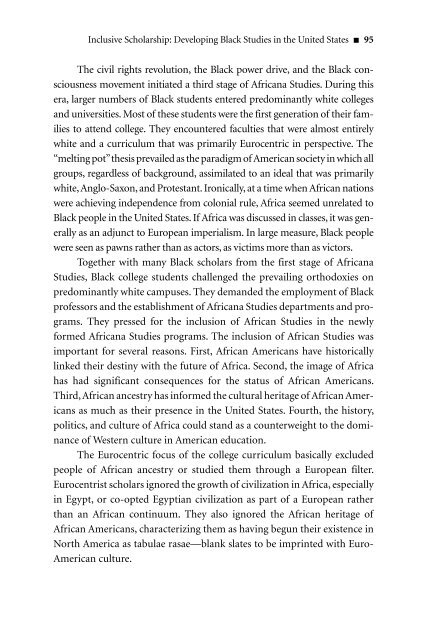Inclusive Scholarship: Developing Black Studies - Ford Foundation
Inclusive Scholarship: Developing Black Studies - Ford Foundation
Inclusive Scholarship: Developing Black Studies - Ford Foundation
You also want an ePaper? Increase the reach of your titles
YUMPU automatically turns print PDFs into web optimized ePapers that Google loves.
<strong>Inclusive</strong> <strong>Scholarship</strong>: <strong>Developing</strong> <strong>Black</strong> <strong>Studies</strong> in the United States 95<br />
The civil rights revolution, the <strong>Black</strong> power drive, and the <strong>Black</strong> consciousness<br />
movement initiated a third stage of Africana <strong>Studies</strong>. During this<br />
era, larger numbers of <strong>Black</strong> students entered predominantly white colleges<br />
and universities. Most of these students were the first generation of their families<br />
to attend college. They encountered faculties that were almost entirely<br />
white and a curriculum that was primarily Eurocentric in perspective. The<br />
“melting pot”thesis prevailed as the paradigm of American society in which all<br />
groups, regardless of background, assimilated to an ideal that was primarily<br />
white,Anglo-Saxon, and Protestant. Ironically, at a time when African nations<br />
were achieving independence from colonial rule, Africa seemed unrelated to<br />
<strong>Black</strong> people in the United States. If Africa was discussed in classes, it was generally<br />
as an adjunct to European imperialism. In large measure, <strong>Black</strong> people<br />
were seen as pawns rather than as actors, as victims more than as victors.<br />
Together with many <strong>Black</strong> scholars from the first stage of Africana<br />
<strong>Studies</strong>, <strong>Black</strong> college students challenged the prevailing orthodoxies on<br />
predominantly white campuses. They demanded the employment of <strong>Black</strong><br />
professors and the establishment of Africana <strong>Studies</strong> departments and programs.<br />
They pressed for the inclusion of African <strong>Studies</strong> in the newly<br />
formed Africana <strong>Studies</strong> programs. The inclusion of African <strong>Studies</strong> was<br />
important for several reasons. First, African Americans have historically<br />
linked their destiny with the future of Africa. Second, the image of Africa<br />
has had significant consequences for the status of African Americans.<br />
Third,African ancestry has informed the cultural heritage of African Americans<br />
as much as their presence in the United States. Fourth, the history,<br />
politics, and culture of Africa could stand as a counterweight to the dominance<br />
of Western culture in American education.<br />
The Eurocentric focus of the college curriculum basically excluded<br />
people of African ancestry or studied them through a European filter.<br />
Eurocentrist scholars ignored the growth of civilization in Africa, especially<br />
in Egypt, or co-opted Egyptian civilization as part of a European rather<br />
than an African continuum. They also ignored the African heritage of<br />
African Americans, characterizing them as having begun their existence in<br />
North America as tabulae rasae—blank slates to be imprinted with Euro-<br />
American culture.

















